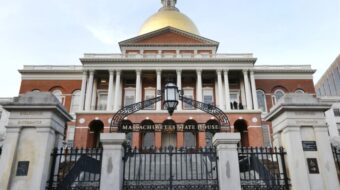
Among the many shock waves set off by the U.S. House Republicans’ proposed continuing resolution on this year’s budget is one brought on by the devastating cuts proposed for the nearly four-decades-old Community Development Block Grants.
Mayors around the country are reacting with alarm to the cuts proposed for the CDBG program. The impact the proposed cuts would have on job creation is a special concern.
Calling the grants “critical to cities,” Mayor Elizabeth Kautz of Burnsville, Minn. and president of the U.S. Conference of Mayors, told reporters last week the cuts would bring a wave of job losses to local communities.
Writing on the web site of the National League of Cities, its president, James Mitchell, called the CDBGs “especially vital for many communities across America,” and warned that cuts “will severely hamper local efforts underway to put people to work and spur local, regional and national recovery.” Mitchell called on mayors around the country to come to Washington D.C. and join in lobbying Congress later this month.
Republican mayors are also worried. Oklahoma City Mayor Mick Cornett, president of the Republican Mayors and Local Officials coalition, told National Public Radio, “There’s outrage, there’s panic, there’s a situation where we have to stop whatever it is we’re doing and be heard on this particular issues at this particular time.”
Cornett said Republicans at the local and the national level have looked at this issue differently for a long time: “They have heard me year in and year out … there’s not a single representative in the state of Oklahoma who doesn’t already know how the mayor of Oklahoma City feels.”
The CDBG program, signed into law by Republican President Gerald Ford, in 1974, provides funds for local community development activities including affordable housing, anti-poverty programs and infrastructure.
The Republican-dominated House of Representatives is seeking to slash the funding in the nearly $4 billion program by over 62 percent, leaving only $1.5 billion for the current fiscal year which ends Sept. 30. Looking ahead to next year, many Republicans are proposing to end the CDBGs altogether.
By contrast, President Obama’s budget proposal for the next fiscal year, while cutting CDBG funding by 7.5 percent, or $300 million, would also increase funds to programs aiding the homeless and providing housing for low-income tenants.
About 1,200 communities around the country are currently receiving CDBG grants.
House Democrats are vowing a fight-back. U.S. Rep. Rosa DeLauro, D-Conn., said last week she’ll wage a struggle against the Republicans’ draconian cuts to social services, and while she generally backs the president’s proposals she is against cuts to CDBG and LIHEAP, the Low Income Home Energy Assistance Program.
Also at last week’s press briefing by the U.S. Conference of Mayors, Philadelphia Mayor Michael Nutter called the Republicans’ proposal a bazooka pointed at cities. “There are cuts, and there’s insanity, and this is insanity,” he said.
Davenport, Iowa Mayor Bill Gluba threatened that if they aren’t heard, the mayors will bring people who have been helped by the CDBGs to the halls of Congress. “We are not going to let them destroy this fundamental, basic program that has served this country for over 30 years,” he said
Mesa, Ariz. Mayor Scott Smith said slashing the block grants would just shift responsibility to fund the services to the cities, which are already struggling with budget deficits from state budget cuts and declining local revenues.
Photo: Kentucky Gov. Steve Beshear, shaking hands with firefighters, announces a $500,000 Community Development Block grant to rehabilitate a currently vacant building into the new Russellville Fire Station. The 11,136-square-foot facility will be rehabbed with the latest green technologies that will meet Leadership in Energy and Environmental Design (LEED) Green Building standards. (Gov. Beshear’s Office/CC)










